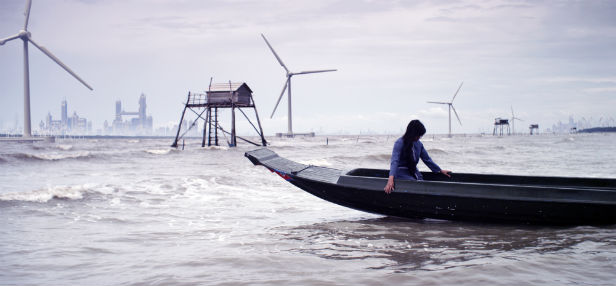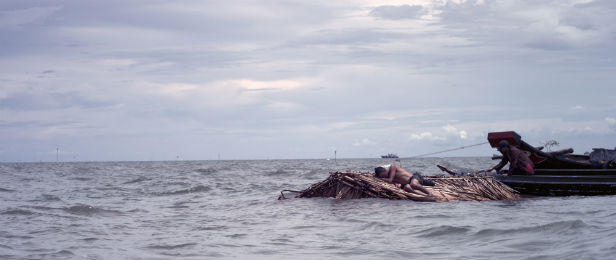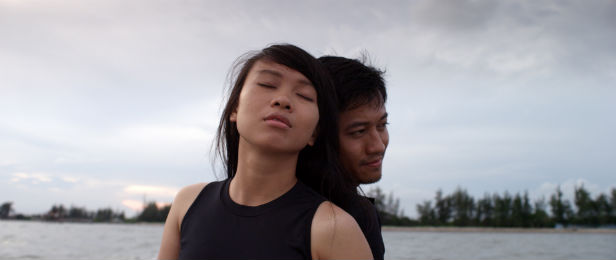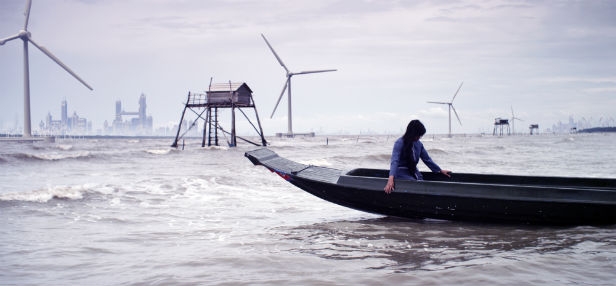 Minh Nguyen-Vo’s NUOC 2030 is playing as part of the Asia House Film Festival, and genre fans should be sure to check out what the writer-director describes as the first Vietnamese sci-fi film.
Minh Nguyen-Vo’s NUOC 2030 is playing as part of the Asia House Film Festival, and genre fans should be sure to check out what the writer-director describes as the first Vietnamese sci-fi film.
NUOC 2030 is “part dystopian sci-fi, part mystery and part romance, this dreamlike second feature set in a not-too-distant future Vietnam where climate change has resulted in the submersion of over half the country’s farmland, leaving a population reliant on fishing from houseboats and floating farms owned by competing multinationals.
The plot centres on a young woman’s quest to discover the murderer of her husband, a self-sufficient farmer whose corpse is discovered floating in the water. The immediate suspect is an environmental scientist with whom she embarked on a passionate romance ten years before. Her journey towards the truth uncovers hints of a corporate cover-up involving potentially lethal genetically-modified food.”
We spoke to the filmmaker about addressing climate change through genre, the state of the film industry in Vietnam, and seeing the global reaction to his movie.
How would you pitch Nuoc 2030?
That it would be the first Vietnamese sci-fi film ever made in Vietnam. That we can raise consciousness about global climate change that is gravely affecting South Vietnam through the rising water level.
Nước, in the Vietnamese title of the film, means water, but it also means a country, a nation. Water covers more than three quarter the surface of earth at the present time. With the predicted rise of sea level due to the global climate change, it will submerge even a greater portion of the landmass that has become so scarce for the ever- increasing human population. The rising sea level can have devastating effects on regions such as South Vietnam where there is a huge population living on land either under or barely above the sea level. According to some predictions, water may submerge up to 50% of the farmland in South Vietnam by 2030.
How did the idea for the film come about?
About three years ago, an investor who was a fan of Buffalo Boy approached me with a short story set in the flooding season that occurs annually in South Vietnam. I liked the main characters, the woman and her husband, but didn’t think that the story lends itself very well to a screenplay, at least to me. It took me another six months to convince the investor to be open to another vision of a film, something that has never been done in Vietnam before. I start writing and I am immediately fascinated by how centuries of fossil fuel consumed by the Europe and North America can somehow completely change the life of a young Vietnamese couple in the 21st century.
 Did the science fiction element come from the environmental story that you wanted to tell?
Did the science fiction element come from the environmental story that you wanted to tell?
Yes, the loss of farmland due to global climate change would result in an acute shortness of food to which Genetics Engineering could offer a beautiful solution. Instead of using floating farms and desalination or evaporation to make fresh water to cultivate agricultural products, a much more lower-cost solution could be provided by manipulating the genes in food plants, allowing them to grow with salt water or even in salt water. However, no one knows for sure how safe these genetically modified organisms are for human consumption? Ultimately, our ways of coping could change us. There’s no way to know for sure. Yet we must forge ahead.
There are elements of a few different genres here; did the story quite naturally work out as a hybrid or were you looking to create a blend?
Nuoc 2030 is perhaps at the fringe of science fiction as popularly understood in cinema. It is a speculative film about the near future, where an intimate human story is set in an adverse environment due to global climate change. The elements of sci-fi, mystery and romance came together very organically very early in the writing process.
 Was it challenging to shoot so much of the film on water?
Was it challenging to shoot so much of the film on water?
I think that every film project is a challenge to shoot. But working on water has its own difficulty in particular with the very limited budget that we had. You cannot count on anything that would stay still. Everything keeps moving with the currents, the tide, the wind and the boat movements. Everything from production design, blocking the action to lighting and camera equipments had to be thought out from the beginning.
From the start, I wanted to follow in detail the daily life of the people who stay behind in this apocalyptic region in 2030 South Vietnam. So the idea that I discussed with Bao Nguyen, the director of photography and producer, was to make a “documentary of the future”. Many scenes in the script are set on fast moving skiffs and night scenes on small wooden boat with dialogue, where the use of generator is out of the question. We discussed and planned out every thing we could think of. But it was mainly Bao who comes from a background in documentary filmmaking that has made it possible for us to make this documentary of the future. Using batteries and a few simple light sources and working in extremely tight spaces, Bao was able to create the atmosphere that the film calls for. So the shoot was very green in terms of Carbon footprint too.
What was the process like of raising funds for the movie? Is there a structure in Vietnam for the film industry?
There have been great developments of the infrastructure of filmmaking in Vietnam thanks to the amount of commercial feature films and television productions made in the last decade. The availability of state-of-the-art cinematographic equipments as well as high quality local technicians, and most important of all the emergence of new talents, have improved so much in the last five years. Finally, the influx of diasporic Vietnamese with skill and talent both behind and in front of the camera has changed the landscape of filmmaking in Vietnam tremendously.
As for financing a noncommercial film in Vietnam, it has always been very difficult since there is no governmental support. Most projects have to seek private sources and aid from Europe or the US. Nuoc 2030 is not an exception. Besides private finance from a Vietnamese investor, we are grateful for the financial support from the Alfred P. Sloan Foundation and the Tribeca Film Institute.
 Were there any films or filmmakers in particular that inspired you?
Were there any films or filmmakers in particular that inspired you?
Tarkovsky, Kurosawa, Ceylan and many others.
How have you found the experience of taking the film around festivals around the world?
Even though Nuoc 2030 is a very local story set in a small town in South Vietnam, the environmental issue of climate change is global. The world premier of Nuoc 2030 was at Berlinale, where it opened the 2014 Panorama section. The reception by the audience as well as the local media was more than enthusiastic. Since then the film has traveled to festivals from Europe to Africa, from America to Asia. I have had many occasions to meet audiences of all ages and social backgrounds that passionately shared with me their thoughts that continue to broaden my vision and deepen my knowledge about the issue of global warming.
What are you working on next?
I have several projects in different stages of development and I am not sure which one will get made first. The financing of personal films has become so complex and difficult that it has taken so long to bring a project to fruition. In addition, the market for indie film is being challenged from many different fronts. We need every support possible, in particular from the distribution side to keep personal film productions alive.
ASIA HOUSE FILM FESTIVAL 2015 runs from 27 – 31 March 2015. For more information, visit their website:
http://asiahouse.org/events/category/asia-house-film-festival-2015/
Keep up with the latest genre news with the new issue of SciFiNow.

